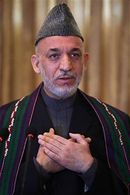 Whatever happens in Kabul now, the next couple of months will be hard going. Hamid Karzai will form a new government, perhaps with Abdulllah Abdullah. But nobody expects the Karzai III government to be any better or less corrupt than versions I and II. Quite the opposite.
Whatever happens in Kabul now, the next couple of months will be hard going. Hamid Karzai will form a new government, perhaps with Abdulllah Abdullah. But nobody expects the Karzai III government to be any better or less corrupt than versions I and II. Quite the opposite.
In his bid for re-election, President Karzai surrounded himself with chequered figures who could bring him votes: warlords suspected of war crimes, corruption and drug trafficking. None is as influential as Marshal Fahim, his running mate, who has long been suspected of drug-running and other crimes. Expect to look back at the Afghan government’s past performance as a model of probity and efficiency.
Despite this, President Obama is likely order a medium-sized military surge, and unveil some kind of “Contract with Karzai”, replete with benchmarks for what the US administration expects the Afghan government to do. Many of these are likely to focus on the Afghan army (ANA), which has come to be seen as an unassailable part of any strategy. Expect Obama, Brown, Rasmussen etc to say they have received Karzai’s “commitment”, “promise”, “guarantee” and so on to build the Afghan army and police.
But rather than just expanding the army – which will face problems I have described before — new thinking is required. Three ideas should on the table.
First, the US should develop an ANA Corps of Engineers, modelled on the US version. This will create a local capability to do the “build” part of “clear, build, hold” and may bequeath the society with a trained cadre of engineers, who can make a difference long after they have served in the army. To create longer-term opportunities, the US should adopt Kabul University’s Faculty of Engineering and create a specialised track for ex-servicemen.
Second, the country needs to find a better way to look after its soldiers. When I asked one of the British army’s COIN experts what it would take to make the ANA more effective, he told me “the same as what makes a British soldier fight – leadership, unit cohesion, the promise of medical evacuation, the support of comrades, assistance to your family if you die etc.” When ANA soldiers are poorly paid, get shaken down by their superiors and have to fear for the lives of their families if they get killed, it is no wonder they become corrupt, rapacious and ineffective.
To deal with this, the Afghan government should introduce a GI BILL that provides a range offers for soldiers.
Tied to this, the way soldiers are paid needs to change. Many leave their posts to travel home and hand money to their families, so why not pay them over the mobile phone network in a form of e-hawala?
Things are bad it is true, but new thinking about the army may help build a military force that can hold off, if not actually defeat, the insurgency, and “build” not just “clear”.






Comments